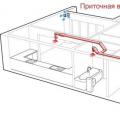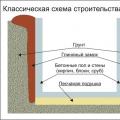In the desire to cause as little damage to the environment as possible and reduce the consumption of non-renewable energy resources, many homeowners are considering alternative heating as a source for heating their home in the winter. At the moment, homeowners have access to a variety of alternative heating sources that use solar energy, fuel pellets, wood briquettes, geothermal pumps, etc. in the process of generating heat.
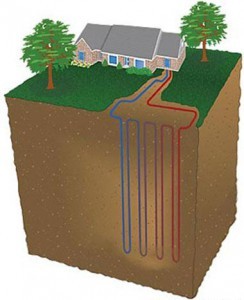 Such systems are not only safe for the environment, but also provide a number of advantages to home owners - they do not involve the use of products from the gas, oil or energy industries and reduce monthly heating costs. To find out which home heating alternative is the most acceptable and profitable, you should familiarize yourself with the specifics of each heating system available on the market today.
Such systems are not only safe for the environment, but also provide a number of advantages to home owners - they do not involve the use of products from the gas, oil or energy industries and reduce monthly heating costs. To find out which home heating alternative is the most acceptable and profitable, you should familiarize yourself with the specifics of each heating system available on the market today.
 Currently, alternative types of heating are represented by a variety of devices, among which there is a geothermal pump that allows you to efficiently generate heat in homes located in the temperate climate zone. According to the principle of operation, a geothermal system is similar to a standard home heating scheme - for its operation it is necessary for the circulation of the coolant, however, the key element of such a system is not a boiler, but a geothermal pump. Like a traditional gas boiler, this appliance is compact in size and does not take up much space in the house.
Currently, alternative types of heating are represented by a variety of devices, among which there is a geothermal pump that allows you to efficiently generate heat in homes located in the temperate climate zone. According to the principle of operation, a geothermal system is similar to a standard home heating scheme - for its operation it is necessary for the circulation of the coolant, however, the key element of such a system is not a boiler, but a geothermal pump. Like a traditional gas boiler, this appliance is compact in size and does not take up much space in the house.
The efficiency of the pump is impressive - with one kilowatt of electricity consumed, it generates five kilowatts of heat.
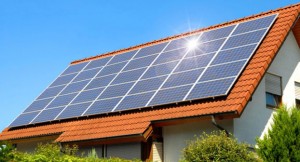 The principle of operation of the geothermal system is that the heat exchanger is placed in the thickness of the earth or in the thickness of thermal waters, and the coolant circulating in it takes on the ambient temperature. Next, the heated coolant enters the heat pump and then is fed into the circuit, giving off heat to the room.
The principle of operation of the geothermal system is that the heat exchanger is placed in the thickness of the earth or in the thickness of thermal waters, and the coolant circulating in it takes on the ambient temperature. Next, the heated coolant enters the heat pump and then is fed into the circuit, giving off heat to the room.
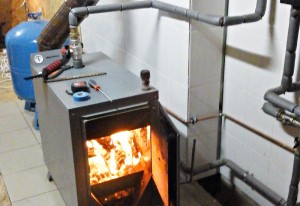 This alternative heating method is silent, safe and very efficient. At the same time, the source of heat for the geothermal heating system is an endless resource that is available at any time. Among the disadvantages of this method, there are such nuances as the complexity of installation, the high cost of equipment, the laboriousness of land work, so making geothermal alternative heating sources with your own hands will be quite problematic and you will have to resort to the help of geodesy specialists.
This alternative heating method is silent, safe and very efficient. At the same time, the source of heat for the geothermal heating system is an endless resource that is available at any time. Among the disadvantages of this method, there are such nuances as the complexity of installation, the high cost of equipment, the laboriousness of land work, so making geothermal alternative heating sources with your own hands will be quite problematic and you will have to resort to the help of geodesy specialists.
Use of solar energy
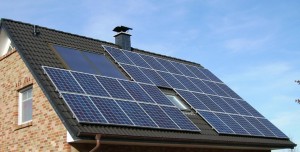 Solar heating alternatives can be active or passive. Passive solar heating relies on the use of special elements in the building structure to collect and store energy. Projects for the construction of such houses include the placement of large windows on the south side of the facade, as well as the presence of surfaces inside the house to absorb and store solar energy. Such absorbing surfaces can be concrete walls and floors and other heat-saving materials in the construction of the house. They collect heat and store it for later use.
Solar heating alternatives can be active or passive. Passive solar heating relies on the use of special elements in the building structure to collect and store energy. Projects for the construction of such houses include the placement of large windows on the south side of the facade, as well as the presence of surfaces inside the house to absorb and store solar energy. Such absorbing surfaces can be concrete walls and floors and other heat-saving materials in the construction of the house. They collect heat and store it for later use.
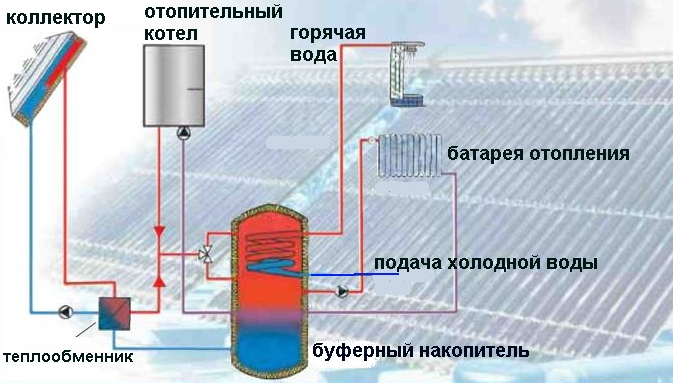 Active heating systems for a private house are alternative, they involve the presence of complex and expensive equipment - solar collectors, heat exchangers, tanks and elements to control energy collection, a parabolic solar steam boiler, etc. In the process, active solar heating systems rely on the use of electricity needed to power some elements.
Active heating systems for a private house are alternative, they involve the presence of complex and expensive equipment - solar collectors, heat exchangers, tanks and elements to control energy collection, a parabolic solar steam boiler, etc. In the process, active solar heating systems rely on the use of electricity needed to power some elements.
Both heating systems are quite efficient and use 100% renewable solar energy as the heat source.
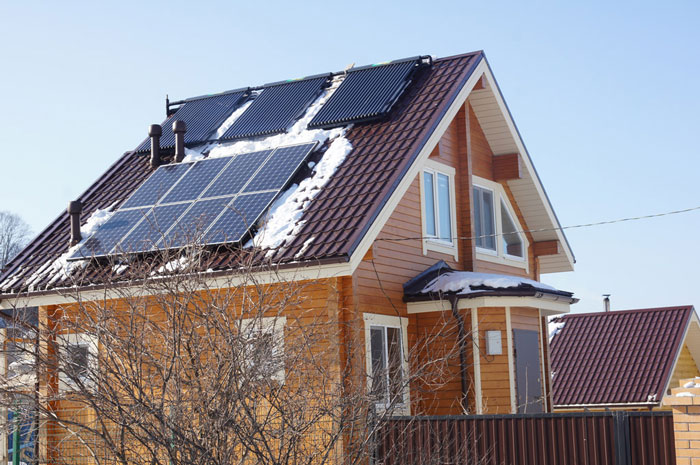 They can be used for heating and hot water supply of houses. Among the advantages of this type of heating, it is worth noting the absence of harmful emissions, environmental friendliness, stable operation, and a reduction in monthly heating costs. Disadvantages are also present and lie in the high cost of equipment and the complexity of its installation in the house.
They can be used for heating and hot water supply of houses. Among the advantages of this type of heating, it is worth noting the absence of harmful emissions, environmental friendliness, stable operation, and a reduction in monthly heating costs. Disadvantages are also present and lie in the high cost of equipment and the complexity of its installation in the house.
Boilers using renewable energy sources
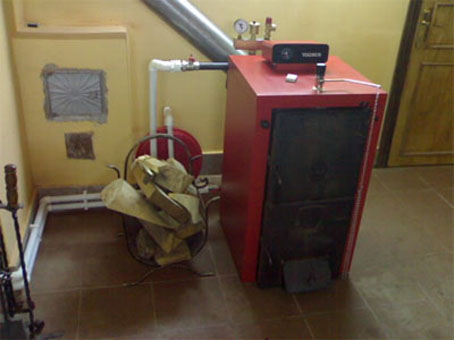 Unlike the systems listed above, which are complex and expensive, heating a private house with a wood-burning boiler can become an affordable and effective option for heating a house for a wide range of rational and economical owners. At the moment, wood heating of a country house is a good alternative to traditional gas boilers, the use of which implies the inevitable receipt of solid gas bills every month. And you can find out how to organize heating at home without gas.
Unlike the systems listed above, which are complex and expensive, heating a private house with a wood-burning boiler can become an affordable and effective option for heating a house for a wide range of rational and economical owners. At the moment, wood heating of a country house is a good alternative to traditional gas boilers, the use of which implies the inevitable receipt of solid gas bills every month. And you can find out how to organize heating at home without gas.
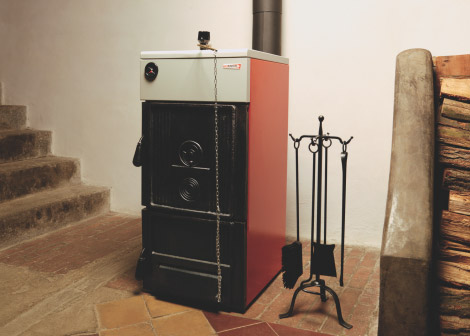 At the same time, the owners of the house who have chosen this heating option can buy firewood for heating at an affordable price or prepare it themselves and achieve even more impressive savings. You can buy wood-fired boilers for home heating, prices for which depend on the chosen model, in a store or on the manufacturer's website. When choosing a boiler, you should pay attention to its specification.
At the same time, the owners of the house who have chosen this heating option can buy firewood for heating at an affordable price or prepare it themselves and achieve even more impressive savings. You can buy wood-fired boilers for home heating, prices for which depend on the chosen model, in a store or on the manufacturer's website. When choosing a boiler, you should pay attention to its specification.
The following indicators are of decisive importance:
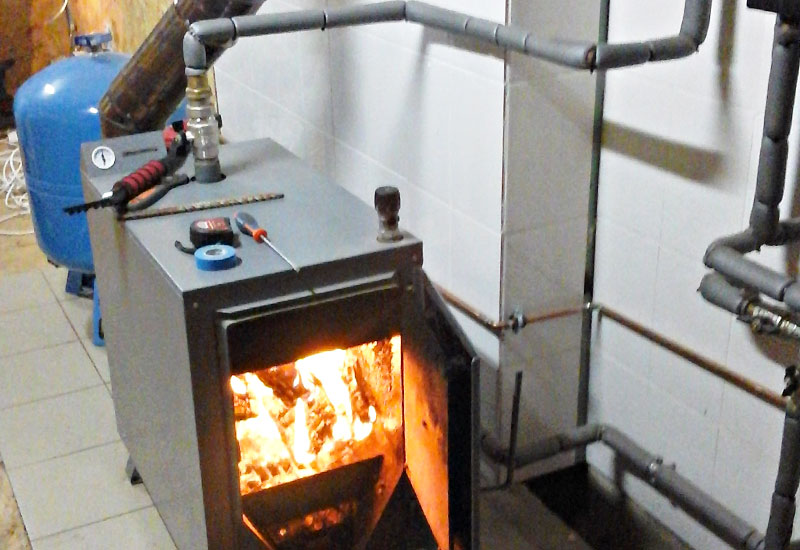
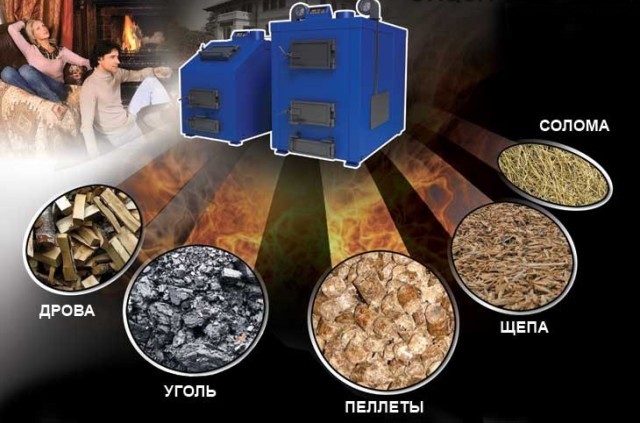 It is worth noting that firewood is not the only type of fuel that boilers can run on. In particular, alternative heating boilers can use sawdust, peat briquettes, pellets, fuel pellets as a combustible fuel. Such materials are much cheaper than gas and liquid fuels, such as fuel oil. In addition, they can be produced in any country and do not require the establishment of supplies from other countries.
It is worth noting that firewood is not the only type of fuel that boilers can run on. In particular, alternative heating boilers can use sawdust, peat briquettes, pellets, fuel pellets as a combustible fuel. Such materials are much cheaper than gas and liquid fuels, such as fuel oil. In addition, they can be produced in any country and do not require the establishment of supplies from other countries.
 Renewable wood-fired boilers can be used as primary or secondary heat sources in the home, and the owner can choose the model that best complements the existing heating system and makes it more efficient and economical.
Renewable wood-fired boilers can be used as primary or secondary heat sources in the home, and the owner can choose the model that best complements the existing heating system and makes it more efficient and economical.
prospects
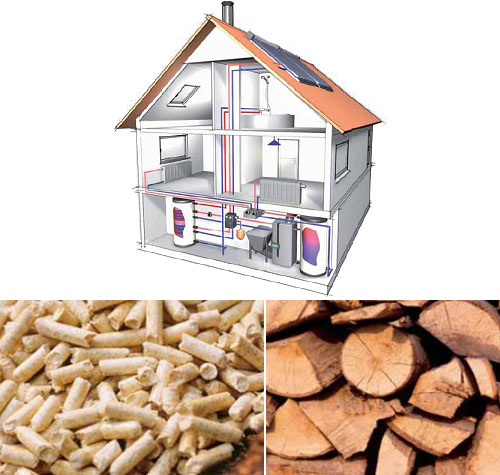 Competition among companies involved in the production and sale of alternative heating systems motivates manufacturers to establish more and more affordable prices to attract customers. The authorities of states that do not have their own sources of oil and gas and depend on export supplies of fuel are also interested in using alternative heating. Therefore, it is likely that in the coming years, the installation of alternative heating systems in the house will become commonplace, and homeowners will be able to take advantage of the operation of an environmentally friendly system that is qualitatively different from traditional heat sources.
Competition among companies involved in the production and sale of alternative heating systems motivates manufacturers to establish more and more affordable prices to attract customers. The authorities of states that do not have their own sources of oil and gas and depend on export supplies of fuel are also interested in using alternative heating. Therefore, it is likely that in the coming years, the installation of alternative heating systems in the house will become commonplace, and homeowners will be able to take advantage of the operation of an environmentally friendly system that is qualitatively different from traditional heat sources.

